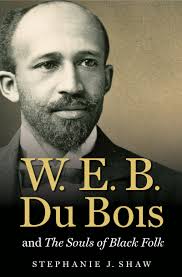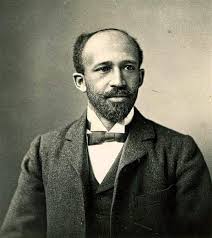The Souls of Black Folk Page #23
The Souls of Black Folk is a 1903 work of American literature by W. E. B. Du Bois. It is a seminal work in the history of sociology and a cornerstone of African-American literature. The book contains several essays on race, some of which the magazine Atlantic Monthly had previously published.
With all their larger vision and deeper sensibility, these men have usually been conservative, careful leaders. They have seldom been agitators, have withstood the temptation to head the mob, and have worked steadily and faithfully in a thousand communities in the South. As teachers, they have given the South a commendable system of city schools and large numbers of private normal-schools and academies. Colored college-bred men have worked side by side with white college graduates at Hampton; almost from the beginning the backbone of Tuskegee’s teaching force has been formed of graduates from Fisk and Atlanta. And to-day the institute is filled with college graduates, from the energetic wife of the principal down to the teacher of agriculture, including nearly half of the executive council and a majority of the heads of departments. In the professions, college men are slowly but surely leavening the Negro church, are healing and preventing the devastations of disease, and beginning to furnish legal protection for the liberty and property of the toiling masses. All this is needful work. Who would do it if Negroes did not? How could Negroes do it if they were not trained carefully for it? If white people need colleges to furnish teachers, ministers, lawyers, and doctors, do black people need nothing of the sort? If it is true that there are an appreciable number of Negro youth in the land capable by character and talent to receive that higher training, the end of which is culture, and if the two and a half thousand who have had something of this training in the past have in the main proved themselves useful to their race and generation, the question then comes, What place in the future development of the South ought the Negro college and college-bred man to occupy? That the present social separation and acute race-sensitiveness must eventually yield to the influences of culture, as the South grows civilized, is clear. But such transformation calls for singular wisdom and patience. If, while the healing of this vast sore is progressing, the races are to live for many years side by side, united in economic effort, obeying a common government, sensitive to mutual thought and feeling, yet subtly and silently separate in many matters of deeper human intimacy,—if this unusual and dangerous development is to progress amid peace and order, mutual respect and growing intelligence, it will call for social surgery at once the delicatest and nicest in modern history. It will demand broad-minded, upright men, both white and black, and in its final accomplishment American civilization will triumph. So far as white men are concerned, this fact is to-day being recognized in the South, and a happy renaissance of university education seems imminent. But the very voices that cry hail to this good work are, strange to relate, largely silent or antagonistic to the higher education of the Negro. Strange to relate! for this is certain, no secure civilization can be built in the South with the Negro as an ignorant, turbulent proletariat. Suppose we seek to remedy this by making them laborers and nothing more: they are not fools, they have tasted of the Tree of Life, and they will not cease to think, will not cease attempting to read the riddle of the world. By taking away their best equipped teachers and leaders, by slamming the door of opportunity in the faces of their bolder and brighter minds, will you make them satisfied with their lot? or will you not rather transfer their leading from the hands of men taught to think to the hands of untrained demagogues? We ought not to forget that despite the pressure of poverty, and despite the active discouragement and even ridicule of friends, the demand for higher training steadily increases among Negro youth: there were, in the years from 1875 to 1880, 22 Negro graduates from Northern colleges; from 1885 to 1890 there were 43, and from 1895 to 1900, nearly 100 graduates. From Southern Negro colleges there were, in the same three periods, 143, 413, and over 500 graduates. Here, then, is the plain thirst for training; by refusing to give this Talented Tenth the key to knowledge, can any sane man imagine that they will lightly lay aside their yearning and contentedly become hewers of wood and drawers of water? No. The dangerously clear logic of the Negro’s position will more and more loudly assert itself in that day when increasing wealth and more intricate social organization preclude the South from being, as it so largely is, simply an armed camp for intimidating black folk. Such waste of energy cannot be spared if the South is to catch up with civilization. And as the black third of the land grows in thrift and skill, unless skilfully guided in its larger philosophy, it must more and more brood over the red past and the creeping, crooked present, until it grasps a gospel of revolt and revenge and throws its new-found energies athwart the current of advance. Even to-day the masses of the Negroes see all too clearly the anomalies of their position and the moral crookedness of yours. You may marshal strong indictments against them, but their counter-cries, lacking though they be in formal logic, have burning truths within them which you may not wholly ignore, O Southern Gentlemen! If you deplore their presence here, they ask, Who brought us? When you cry, Deliver us from the vision of intermarriage, they answer that legal marriage is infinitely better than systematic concubinage and prostitution. And if in just fury you accuse their vagabonds of violating women, they also in fury quite as just may reply: The rape which your gentlemen have done against helpless black women in defiance of your own laws is written on the foreheads of two millions of mulattoes, and written in ineffaceable blood. And finally, when you fasten crime upon this race as its peculiar trait, they answer that slavery was the arch-crime, and lynching and lawlessness its twin abortions; that color and race are not crimes, and yet it is they which in this land receive most unceasing condemnation, North, East, South, and West.
Translation
Translate and read this book in other languages:
Select another language:
- - Select -
- 简体中文 (Chinese - Simplified)
- 繁體中文 (Chinese - Traditional)
- Español (Spanish)
- Esperanto (Esperanto)
- 日本語 (Japanese)
- Português (Portuguese)
- Deutsch (German)
- العربية (Arabic)
- Français (French)
- Русский (Russian)
- ಕನ್ನಡ (Kannada)
- 한국어 (Korean)
- עברית (Hebrew)
- Gaeilge (Irish)
- Українська (Ukrainian)
- اردو (Urdu)
- Magyar (Hungarian)
- मानक हिन्दी (Hindi)
- Indonesia (Indonesian)
- Italiano (Italian)
- தமிழ் (Tamil)
- Türkçe (Turkish)
- తెలుగు (Telugu)
- ภาษาไทย (Thai)
- Tiếng Việt (Vietnamese)
- Čeština (Czech)
- Polski (Polish)
- Bahasa Indonesia (Indonesian)
- Românește (Romanian)
- Nederlands (Dutch)
- Ελληνικά (Greek)
- Latinum (Latin)
- Svenska (Swedish)
- Dansk (Danish)
- Suomi (Finnish)
- فارسی (Persian)
- ייִדיש (Yiddish)
- հայերեն (Armenian)
- Norsk (Norwegian)
- English (English)
Citation
Use the citation below to add this book to your bibliography:
Style:MLAChicagoAPA
"The Souls of Black Folk Books." Literature.com. STANDS4 LLC, 2025. Web. 5 Jan. 2025. <https://www.literature.com/book/the_souls_of_black_folk_310>.




Discuss this The Souls of Black Folk book with the community:
Report Comment
We're doing our best to make sure our content is useful, accurate and safe.
If by any chance you spot an inappropriate comment while navigating through our website please use this form to let us know, and we'll take care of it shortly.
Attachment
You need to be logged in to favorite.
Log In